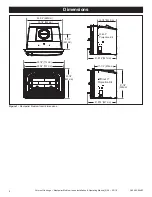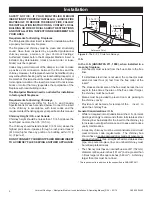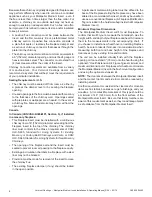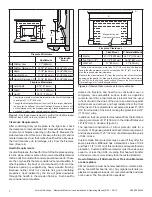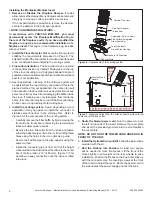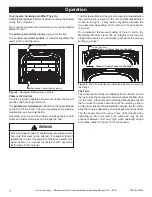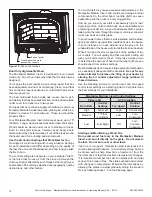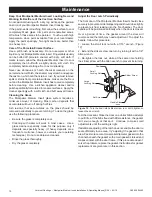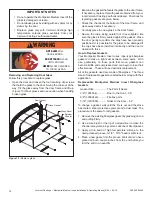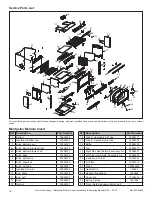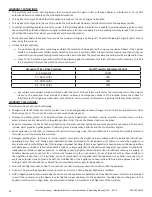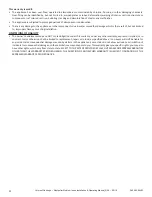
13
Vermont Castings • Montpelier Medium Insert Installation & Operating Manual_R26 • 05/19
3-90-30004403
NOTE:
Some chimneys need to be “primed,” or warmed up,
before they will draw sufficiently to start a fire. To correct this
situation, roll up a couple pieces of newspaper, place them
on top of the kindling and toward the back of the stove, light
them, and close the doors. This should heat the chimney
enough to initiate a draft.
Once the draft is established, open the front door and light
the rest of the fuel from the bottom. Do not light the main
bed of fuel until the chimney begins drawing, and repeat
the procedure as often as necessary if the initial attempt is
unsuccessful.
4. Once a good ember bed of at least 3-4" (76 - 102 mm)
has formed, add the desired amount of wood and close
the primary air control to a medium-low setting. The fire
volume will diminish immediately, but the Montpelier
Medium Insert will continue to heat up. Maintain control
of the fire using the primary air control, and remember:
reduce the setting for less heat, increase the setting for
more heat. Refer to the air control settings chart on Page
11 for recommended settings at different burn rates.
Do not over-fire this heater.
Overfiring may cause a house fire, or can result in
permanent damage to the stove. If an exterior part of
the Montpelier Medium Insert glows, you are overfiring.
Reloading and Reviving a Wood Fire
Set the air control on “High,” and wait at least fifteen seconds
for the draft to increase. Turn the convection blower off. Open
the door slowly.
IMPORTANT: While the stove is hot, toss and sift the
coals with each stove loading. This loosens and helps
burn coals that become buried in the ash. Push coals
away from the three bottom air jets. Creating this “void”
helps maintain a reliable fire.
Check the ash level, and remove excess ash. Three (3)
primary air holes located under the front brick provide air to
the coal bed. (Figure 11) These holes should be cleared of
ash for proper performance.
Add the fuel, smaller pieces first. If it is necessary to use
wood smaller than the 18" (460 mm) optimum size, be sure
to fill the firebox as completely as possible by loading the
wood pieces alternately on the left and right. Split wood will
fill the firebox more completely and reduce the frequency of
reloading. If possible, stack wood diagonally to maximize air
spaces between fired pieces.
If you have an ember bed of at least 2-3" (51 - 76 mm), the
air setting may not need to be adjusted. If the ember bed is
less than 2-3" (51 - 76 mm), you may have to leave the air
setting on high for a few minutes until flames appear.
Finally, adjust the air control and fan speed for your desired
heat level.
Follow these guidelines as you start and maintain the fire, and
remove the ashes. Prior to starting a fire with a cold stove, it
is recommended to clear the lower primary air holes located
under the front brick. To do this, remove the andiron and lift
out the front refractory brick. Sweep any ash accumulation
out of the three (3) air slots. Keeping these slots clear of ash
will ensure better performance.
1. Open the primary air control fully.
2. Lay some crumpled newspapers in the bottom. Place on
the paper six or eight pieces of dry, finely-split kindling.
On the kindling lay two or three larger sticks of split dry
wood approximately 1-2" (25-50 mm).
Do not use chemicals or fluids to start the fire. Do not burn
garbage or flammable fluids such as gasoline, naptha,
or engine oil. Also, never use gasoline-type lantern fuel,
kerosene, charcoal lighter fluid, or similar liquids to start
or “freshen up” a fire in this heater. Keep all such liquids
well away from the heater while it is in use.
3. Light the newspaper and close the door. Gradually build
up the fire by adding a few 3-5" (76 -127 mm) diameter
splits.
If this is your initial break-in fire, let the fire burn brightly, but
not to excess. Control the fire’s intensity by adjusting the air
control lever. After an hour or so stop adding wood so that
the fire dies out gradually.
For ongoing operation after the initial break-in, continue to
add a few sticks at a time of a progressively larger size. Be
sure to keep the fuel load behind the front grate bar at all
times. Continue until you have a live ember bed at least
3-4" (76 - 102 mm) deep. This may take an hour or longer,
particularly when the Montpelier Medium Insert is vented to an
exterior masonry chimney or when you are just starting a fire.
NOTE:
Effectiveness of a “top-down” method to start a fire.
Smoke emissions when starting a fire can be difficult to
control because the insert is not yet heated to its optimum
temperature. One method of reducing emissions during a
cold start-up is the use of a “top-down” kindling procedure.
In this, place larger pieces of kindling on the bottom of the
kindling pile followed by smaller and smaller pieces as the
pile is added to. Very finely split pieces should be on the
top. Light the kindling pile with a match at the top and allow
the kindling to burn downward into the larger pieces. This
reduces smoke by slowly increasing the fire size without
creating an air-starved condition.
You’ll soon find that the insert is
HOT WHILE IN OPERATION!
KEEP CHILDREN, CLOTHING, AND FURNITURE AWAY.
CONTACT MAY CAUSE SKIN BURNS.
Operate your Montpelier Medium Insert only with the
door fully closed. If the door is left partially open, gas
and flame may be drawn out of the fireplace opening,
creating risks of both fire and smoke.
WARNING
!




